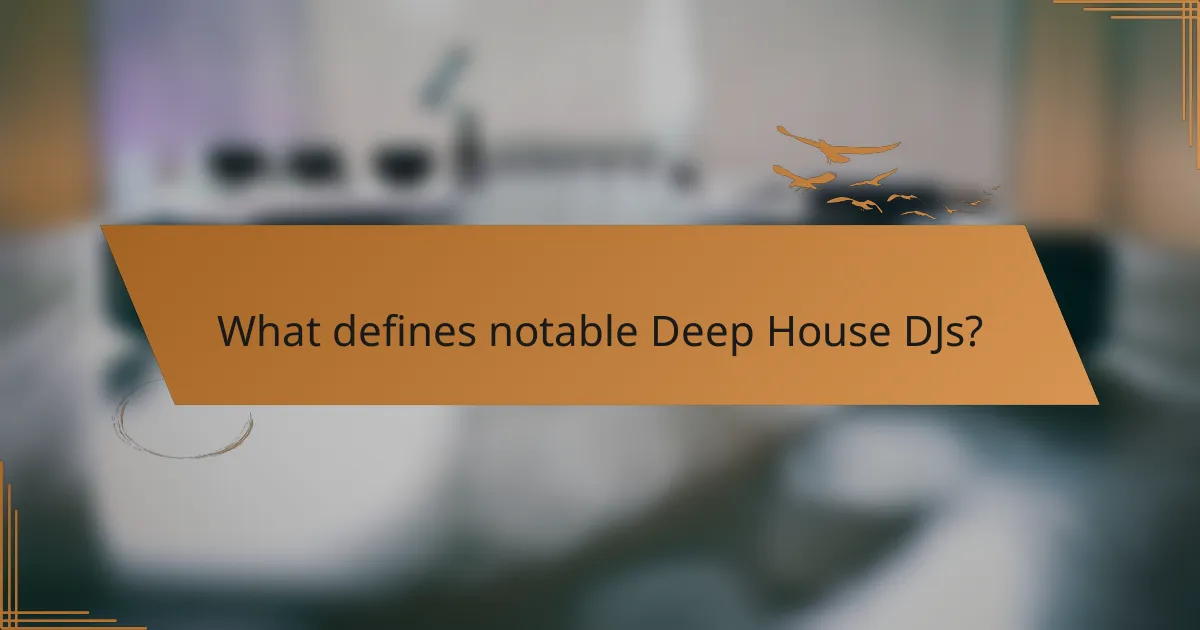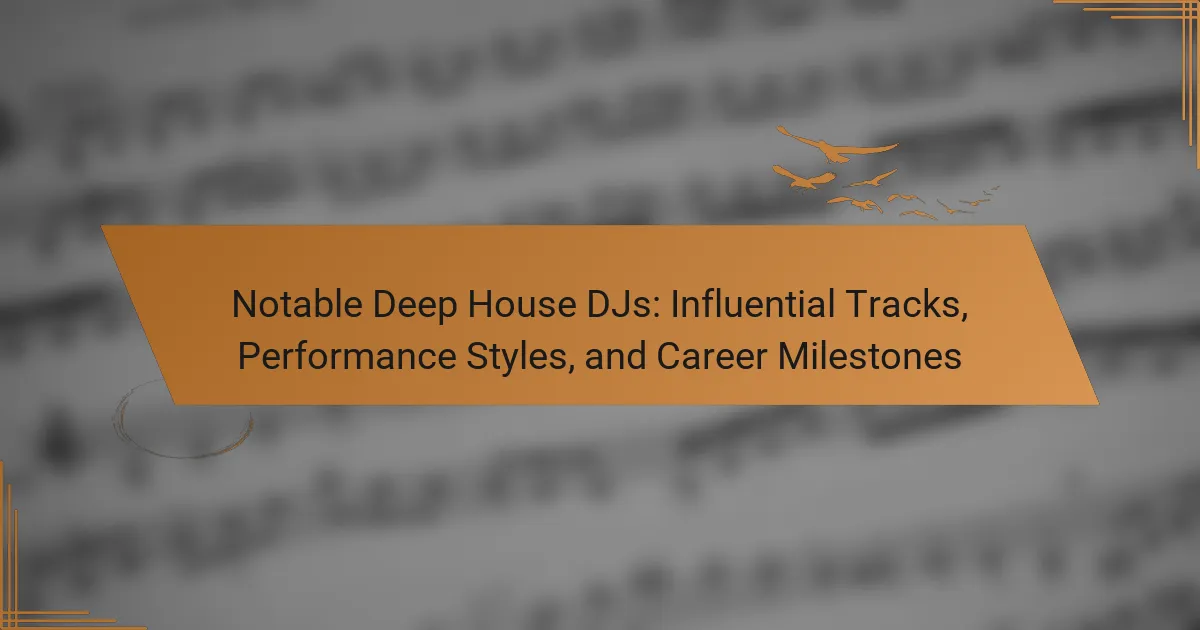Notable deep house DJs are recognized for their distinctive sound, production skills, and significant impact on the genre. This article explores the defining characteristics of these DJs, including their unique performance styles and emotional connections with audiences. It highlights key career milestones such as breakthrough tracks, major festival appearances, and influential collaborations that shape their reputations. Additionally, the article examines how artists like Larry Heard, Kerri Chandler, and Maya Jane Coles contribute to the evolution of deep house music through their innovative approaches and cultural influences. Overall, it provides a comprehensive overview of the elements that define the success and artistry of notable deep house DJs.

What defines notable deep house DJs?
Notable deep house DJs are defined by their unique sound, production skills, and influence within the genre. They often create tracks that blend soulful melodies with deep basslines. Their ability to curate and mix sets that resonate emotionally with audiences sets them apart. Many notable DJs have a distinct style that reflects their personal musical journey. Their influence is often measured by chart success, festival appearances, and collaborations with other artists. For example, artists like Larry Heard and Kerri Chandler are recognized for shaping the deep house sound. The impact of these DJs can also be seen in their ability to innovate and push genre boundaries. Notable deep house DJs often have a dedicated fan base, showcasing their importance in the electronic music scene.
How do notable deep house DJs influence the music scene?
Notable deep house DJs influence the music scene through their unique sound and innovative production techniques. They shape the genre by introducing new rhythms and melodies. Their tracks often blend elements from various music styles, creating fresh auditory experiences. Additionally, these DJs curate memorable live performances that resonate with audiences. They also mentor emerging artists, fostering talent within the community. Collaborations with other musicians expand their reach and impact. Their presence on social media platforms amplifies their influence, allowing them to connect with global fans. Events and festivals featuring these DJs drive trends and set the tone for the deep house genre.
What are the key characteristics of their sound?
The key characteristics of deep house sound include smooth basslines, soulful melodies, and atmospheric elements. The genre often features a tempo range of 120 to 125 BPM. Vocals are typically soft and emotive, enhancing the overall vibe. Chord progressions are rich and jazzy, adding depth to the music. Deep house tracks frequently incorporate ambient sounds, creating a lush soundscape. The use of synthesizers is prevalent, contributing to the genre’s distinctive texture. Percussion is often laid-back, providing a groovy yet relaxed rhythm. These elements combine to create a sound that is both immersive and danceable.
How do they differentiate themselves from other genres?
Deep house DJs differentiate themselves from other genres through their unique blend of soulful melodies and intricate rhythms. They often incorporate elements of jazz, funk, and R&B into their tracks. This genre emphasizes a slower tempo, typically between 120 to 125 BPM. Deep house is characterized by its use of atmospheric pads and deep basslines, creating a rich sound texture. Vocals in deep house tracks are often smooth and emotive, enhancing the overall vibe. The focus on groove and mood sets deep house apart from more mainstream electronic dance music. Additionally, deep house DJs often prioritize a seamless flow during live performances, enhancing the immersive experience. This distinct approach to sound and performance style solidifies their identity within the electronic music landscape.
What role do influential tracks play in a DJ’s career?
Influential tracks are pivotal in a DJ’s career. They establish a DJ’s identity and signature sound. These tracks often define their style and influence their setlists. Influential tracks can lead to increased recognition and opportunities. They help DJs connect with audiences on an emotional level. Many successful DJs attribute their rise to specific tracks that resonated widely. For instance, tracks that become anthems can elevate a DJ’s status in the industry. Overall, influential tracks significantly impact a DJ’s trajectory and success.
Which tracks are considered game-changers in deep house?
“Tracks considered game-changers in deep house include ‘Can You Feel It’ by Mr. Fingers. This track, released in 1986, is often cited as a foundational piece of deep house music. Another significant track is ‘Deep Inside’ by Hardrive, which helped define the genre in the 1990s. ‘The Cure and The Cause’ by Fish Go Deep is also recognized for its influence on modern deep house sounds. These tracks not only showcase the genre’s unique sound but also have impacted countless artists and producers in the deep house scene.”
How do these tracks impact listeners and the genre?
Influential tracks in deep house significantly shape listeners’ experiences and the genre’s evolution. These tracks often evoke strong emotional responses, creating a deep connection with the audience. For example, tracks with melodic elements can enhance feelings of nostalgia or joy. They also introduce innovative sounds and production techniques, pushing the boundaries of the genre. This innovation attracts new listeners and inspires emerging artists. Additionally, landmark tracks frequently define sub-genres, influencing the direction of future music. The impact is measurable; for instance, chart-topping deep house tracks often lead to increased streaming numbers and festival bookings. This cycle of influence reinforces the genre’s popularity and cultural relevance.

What are the performance styles of notable deep house DJs?
Notable deep house DJs exhibit diverse performance styles that define their artistry. Many prioritize a seamless blend of tracks to create an immersive experience. This style often includes extended mixes that maintain a consistent groove. DJs like Larry Heard emphasize atmospheric elements, incorporating soulful melodies and jazzy influences. Others, such as Maya Jane Coles, adopt a more eclectic approach, mixing genres and incorporating live elements.
Some DJs, like Dixon, focus on storytelling through their sets, guiding the audience on a musical journey. This style often involves carefully curated track selection and pacing. In contrast, artists like Black Coffee integrate African rhythms and instruments, showcasing cultural influences in their performances. Overall, each DJ’s unique style contributes to the evolution of deep house music, reflecting personal influences and the broader genre’s diversity.
How do performance styles vary among deep house DJs?
Performance styles among deep house DJs vary significantly based on individual artistic expression and audience engagement. Some DJs prioritize technical mixing skills, focusing on seamless transitions and beatmatching. Others emphasize emotional connection through track selection, creating a journey for listeners. Live performances may include the use of instruments or vocals, adding a unique layer to their sets.
The atmosphere of the venue also influences performance styles. For instance, intimate settings may encourage more personal interactions with the audience. Conversely, larger festivals often see DJs adopting high-energy approaches to captivate massive crowds.
Additionally, cultural influences and personal backgrounds shape how deep house DJs approach their performances. Some may draw from jazz or soul, infusing their sets with organic sounds. Others might incorporate electronic elements, showcasing a fusion of genres.
Ultimately, the diversity in performance styles reflects the individuality of deep house DJs and their creative interpretations of the genre.
What are the common techniques used in live sets?
Common techniques used in live sets include beatmatching, looping, and effects processing. Beatmatching involves aligning the tempo of two tracks for a seamless transition. DJs often use looping to extend sections of a track, creating tension and build-up. Effects processing adds depth and variation to the sound, enhancing the overall experience. Additionally, live remixing allows DJs to manipulate tracks in real-time, showcasing their creativity. These techniques contribute to a dynamic performance, engaging the audience effectively.
How do DJs engage with their audience during performances?
DJs engage with their audience during performances through interactive techniques. They often read the crowd’s energy to adjust their setlist accordingly. This responsiveness creates a connection between the DJ and the audience. DJs may also use visual elements like lighting and visuals to enhance the experience. Additionally, they often encourage audience participation through call-and-response techniques. Engaging with the audience fosters a communal atmosphere, making the performance memorable. Research indicates that audience engagement can significantly enhance the overall experience at live events. This is evidenced by studies showing increased satisfaction when audiences feel involved in the performance.
What influences the choice of performance style?
The choice of performance style is influenced by various factors including personal preference, audience expectations, and cultural context. Personal preference shapes how a DJ connects with music and expresses creativity. Audience expectations dictate the energy and vibe a DJ must create during a performance. Cultural context plays a significant role in determining which styles resonate with specific demographics. Additionally, technological advancements impact performance style by providing new tools and techniques. The evolution of music genres also influences how DJs adapt their styles over time. These factors collectively guide DJs in making informed choices about their performance styles.
How do personal background and experiences shape a DJ’s style?
Personal background and experiences significantly influence a DJ’s style. A DJ’s cultural upbringing affects their musical preferences. This background shapes the genres they gravitate towards. For example, a DJ raised in a diverse musical environment may incorporate various styles into their sets. Personal experiences, such as attending festivals or clubs, also play a role. These experiences expose DJs to different sounds and techniques. Additionally, a DJ’s social interactions can inspire unique mixes and collaborations. Historical context, such as the evolution of music genres, further informs their artistic choices. Ultimately, a DJ’s identity is a blend of these influences, creating a distinctive sound.
What role does venue type play in performance style adaptation?
Venue type significantly influences performance style adaptation in music. Different venues create unique atmospheres that impact audience engagement. For instance, intimate clubs encourage more personal interactions. Large festivals often require high-energy performances to captivate vast crowds.
The acoustics of a venue also dictate sound adjustments. DJs must adapt their mixing techniques based on space and sound quality. Research indicates that audience size and venue layout affect the overall performance dynamics. A study by the University of California found that venue type can alter the emotional response of the audience.
In summary, venue type is crucial in shaping how DJs tailor their performances to enhance the experience for the audience.

What are the key career milestones for notable deep house DJs?
Key career milestones for notable deep house DJs include the release of breakthrough tracks, significant festival performances, and collaborations with other artists. Breakthrough tracks often establish a DJ’s signature sound and attract a loyal following. Major festival performances, such as at Coachella or Tomorrowland, elevate their visibility in the electronic music scene. Collaborations with well-known producers or vocalists can lead to chart-topping hits and wider recognition. Additionally, receiving awards or nominations, such as a Grammy, marks a significant achievement in their career. Establishing a record label can further enhance their influence in the industry. These milestones collectively contribute to the lasting impact of deep house DJs on the music landscape.
How do deep house DJs achieve recognition in the industry?
Deep house DJs achieve recognition in the industry through a combination of unique sound, engaging performances, and effective marketing. They often produce original tracks that showcase their distinctive style. Collaborations with established artists can amplify their visibility. Playing at renowned music festivals and clubs helps them reach larger audiences. Social media presence is crucial for building a fanbase and promoting their work. Networking within the industry allows them to connect with influential figures. Consistent releases of high-quality music maintain their relevance. According to a study by the International Music Summit, 70% of successful DJs leverage social media for promotion, highlighting its importance in gaining recognition.
What are the typical paths to success for these DJs?
Successful DJs typically follow a path that includes building a unique sound, performing live, and networking. They often start by honing their skills in mixing and producing music. Many DJs release tracks on platforms like SoundCloud or Beatport to gain exposure. Performing at local clubs and events helps them establish a fan base. Collaborating with other artists can also enhance their visibility. Social media presence is crucial for marketing their brand. Some DJs gain recognition through remixes of popular songs. Winning DJ competitions can provide significant opportunities for advancement. These steps collectively contribute to their success in the competitive music industry.
How do collaborations and partnerships influence their careers?
Collaborations and partnerships significantly enhance the careers of deep house DJs. They provide opportunities for exposure to new audiences. Working with other artists can lead to innovative sound development. Collaborations often result in chart-topping tracks that boost visibility. Partnerships can also facilitate access to larger events and festivals. This exposure can lead to increased fan engagement and loyalty. Moreover, collaborations enhance networking within the music industry. Successful partnerships often lead to more collaborative projects, creating a cycle of growth and opportunity.
What challenges do deep house DJs face in their careers?
Deep house DJs face several challenges in their careers. One major challenge is market saturation. The electronic music scene has many DJs, making it hard to stand out. Another challenge is financial instability. Many DJs rely on gigs for income, which can be unpredictable. Additionally, evolving music trends pose a challenge. DJs must adapt their style to remain relevant. Networking is also crucial but can be difficult. Building relationships in the industry takes time and effort. Furthermore, mental health issues are prevalent among DJs. The pressure of performance and lifestyle can lead to stress and burnout. Lastly, access to quality equipment can be a barrier for some. High-quality gear is often expensive and not accessible to all aspiring DJs.
How do they overcome obstacles in the competitive music industry?
Notable Deep House DJs overcome obstacles in the competitive music industry through strategic networking and continuous skill development. They build relationships with industry professionals, such as producers and promoters. This networking leads to collaboration opportunities and increased visibility. Additionally, they adapt to changing music trends and audience preferences. By staying relevant, they maintain their fan base and attract new listeners. Many invest in marketing and social media to promote their work effectively. Data shows that DJs who engage actively on platforms like Instagram and TikTok gain more followers. Consistent performance and engagement at events also enhance their reputation. Ultimately, resilience and innovation are key to thriving in this competitive landscape.
What strategies do they employ to maintain relevance over time?
Notable deep house DJs employ several strategies to maintain relevance over time. They continuously evolve their sound to align with current trends. Collaborating with emerging artists helps them stay fresh and innovative. Regularly releasing new music keeps their audience engaged. They also leverage social media platforms for direct interaction with fans. Performing at various music festivals broadens their reach and visibility. Adapting to technological advancements in music production enhances their creative capabilities. Engaging in remixes of popular tracks allows them to tap into wider audiences. These strategies collectively contribute to their sustained influence in the music industry.
What tips can aspiring deep house DJs learn from notable figures?
Aspiring deep house DJs can learn several valuable tips from notable figures in the genre. First, they should focus on developing a unique sound. Artists like Larry Heard emphasize the importance of individuality in music production. Second, mastering the art of mixing is crucial. DJs such as Dixon highlight the need for seamless transitions between tracks. Third, networking within the industry is essential. Figures like Solomun often stress building relationships with other artists and promoters. Additionally, understanding the audience is vital. DJs like Black Coffee advocate for reading the crowd to create an engaging atmosphere. Finally, continuous learning and adaptation are key. Notable DJs often evolve their styles to stay relevant in the ever-changing music landscape.
How can they develop their unique sound and style?
They can develop their unique sound and style by experimenting with various musical elements. This includes blending different genres, such as jazz, funk, and soul, which are foundational to deep house. Incorporating personal influences and experiences into their music helps create authenticity. They should also focus on signature production techniques, such as specific synth sounds or drum patterns. Collaborating with other artists can introduce fresh ideas and perspectives. Regularly performing live allows them to gauge audience reactions and refine their style. Additionally, studying the works of influential deep house DJs can provide inspiration and direction. Engaging with the deep house community fosters growth and innovation in their sound.
What practices can they adopt to build a loyal fan base?
Notable Deep House DJs can adopt several practices to build a loyal fan base. Engaging with fans on social media platforms fosters a sense of community. Regularly sharing exclusive content, such as behind-the-scenes footage, enhances fan connection. Consistent interaction through live Q&A sessions can deepen relationships with followers. Performing at local venues helps build a grassroots following. Hosting events or meet-and-greets allows fans to connect in person. Collaborating with other artists can introduce them to new audiences. Offering merchandise creates a tangible connection to the brand. These practices have been shown to increase fan loyalty and engagement in the music industry.
Notable deep house DJs are characterized by their unique sound, production skills, and significant influence within the genre. This article examines the defining traits of these DJs, including their innovative tracks, diverse performance styles, and key career milestones that contribute to their recognition in the electronic music scene. It highlights the emotional connection they establish with audiences, the impact of influential tracks on their careers, and the strategies they employ to maintain relevance in a competitive industry. Additionally, the article explores how personal backgrounds and venue types shape their performance styles and the challenges they face in their careers.
